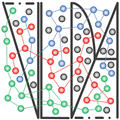Version History: Definitions:
03/20/2015 Version 1.5 added:
An entry for TROTWET and link here.
12/12/2013 Version 1.4: added:
Juror: A person, or one of several persons, rendering a decision on a claim in an adjudication.
10/17/2013 Version 1.3
Added definition of State: an entity claiming an exclusive right to make or enforce law that supersedes voluntary adoption of law or selection of law enforcement agency by any person, unless by written consent of said person.
Revised definition of Consent: agreement formed in the absence of coercion or fraud between two or more persons, none of whom lack rational capacity by reason of age or disability.
All changes prior to 10/17/2013 (Versions 1.0, 1.1, 1.2):
Act or Action: an event caused by a person. (10/07/2013)
Actor: a person who acts. (10/07/2013)
Adjudication: an adversarial dispute resolution process conducted according to a defined procedural law. (10/07/2013)
Cause: (n) a necessary condition precedent to an event that is sufficient to bring about the event without any intervening actor; (v) to bring about or create a cause. (10/07/2013)
Claim: an assertion of a right to recover damages for a harm, based on a defined law, made in an adjudication. (10/07/2013)
Conduct: a set of one or more related actions. (10/07/2013)
Coercion: violence or a threat of violence. (10/07/2013)
Collective entity: two or more persons acting together by agreement to achieve a common purpose. (10/07/2013)
Consent: agreement formed in the absence of coercion or fraud. (26/03/2013)
Event: an objectively detectable change. (10/07/2013)
Forum: an entity responsible for conducting an adjudication; or (archaic) refers to the place at which an adjudication is conducted (in a modern voluntary law society, adjudications are usually conducted by remote conference and it is rarely required for all persons involved to physically meet). (10/07/2013)
Fraud: an intentional falsehood or misrepresentation, made with intent to induce an action by another. (10/07/2013)
Harm: (n) an economically measurable injury to a person or property; (v) to cause a harm. (10/07/2013)
Intention: a purposeful and conscious thought of a person. (10/07/2013)
Intentional: caused by intention. (10/07/2013)
Involuntary: unintentional, or intentional wherein the intention is a rational response to coercion or fraud. (10/07/2013)
Liability: a legal responsibility for a harm caused to another; may include both restoration and deterrent penalties. (10/07/2013)
Law: a defined, self-contained set of rules for resolving a claim. Procedural laws define processes for conducting an adjudication. Substantive laws define processes for determining liability for harms based on factual circumstances. (10/07/2013)
Misrepresentation: a disclosure intentionally omitting a fact known to the discloser, which if known would be likely to influence a reasonable actor in a transaction to which the misrepresentation relates. (26/09/2013)
Party (pl. parties): a person or collective entity involved as claimant or defendant in a claim. (10/07/2013)
Person: a sentient and rational being capable of understanding the law and reaching agreements based on law with other beings; or such a being that lacks the rational capacity of a person because of being immature (e.g., a child) or disabled. (10/07/2013)
Property: the object of a legal right to exclude. (10/07/2013)
Violence: an intentional harm. (10/07/2013)
Voluntary: intentional, wherein the intention is formed without coercion or fraud by another. Voluntary actions may have unintended consequences. (10/07/2013)
